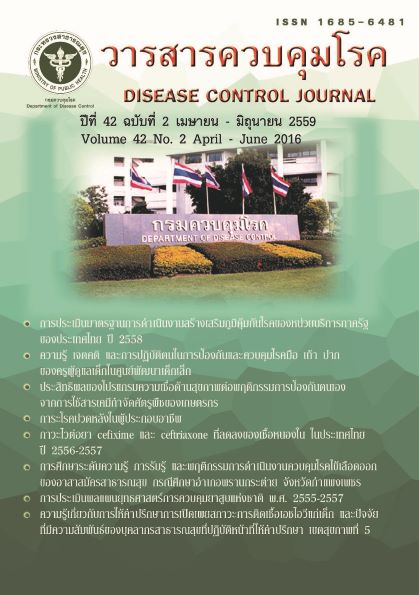Evaluation on the National Strategic Plan for Tobacco Control 2012-2014
DOI:
https://doi.org/10.14456/dcj.2016.24Keywords:
evaluation, strategic plan, tobacco controlAbstract
The cross-sectional study was conducted to summative evaluation of the National Strategic Plan for Tobacco Control 2012-2014. Data were collected from October to December 2014 and compared with targets indicated in the National Strategic Plan for Tobacco Control. Two groups of respondents were enrolled and interviewed. The first group with 4,009 respondents were persons who aged 15 years old and over from Tak, Mukdahan, Kanchanaburi, Surath Thani as representatives of the four regions of Thailand and Bangkok. The second group with 32 respondents was policy makers working in government agencies and ODPCs located in the same provinces with the first group. The results of the evaluation focused on the main target of the national strategic plan found that the current smoking rate of population ages 15 years and over was 20.9 percent with 39.9 percent and 3.7 percent were male and female respectively. The results were higher than expected targets in the National Strategic Plan for Tobacco Control which were 18.7 percent, 37.5 percent and 2.01 percent respectively. There was an increasing tobacco consumption per capita per year which was higher than target set from 547 to 720 (cigarette/person/year), however the consumption of smokeless tobacco was decreasing from 3.9 percent to 3.3 percent. The average age of the new smokers was 17.2 years old and 74.1 percent of smokers were likely to quit smoking. The main reasons to quit smoking included concerning of their own health as well as their connected persons accounted for 59.6 percent. There were 70.3 percent of those who to quit attempt smoking with 90.3 percent of them with a reason that they were unable to control craving for smoking. Therefore, to increase accessibility to services-related for smoking quitting for smokers, the universal health care coverage system should include those services in all health facilities. Furthermore, the quit smoking medications should be included in the Thai National List of Essen¬tial Medicines. Most importantly the tobacco control policy should be issued as the main agenda of provincial and local authorities.
Downloads
References
2. Framework Convention Alliance. Latest ratifica¬tions of the WHO FCTC [Internet]. [cited 2016 Mar 12]. Available from: http://www.fctc.org/ about-fca/tobacco-control-treaty/latest-ratifi¬cations
3. สมคิด พรมจุ้ย. เทคนิคการประเมินโครงการ. สุพรรณบุรี: หจก. ออฟเซทอาร์ท ออโตเมชั่น; 2542.
4. มหาวิทยาลัยสุโขทัยธรรมาธิราช สาขาวิชาวิทยาศาสตร์สุขภาพ. สถิติและระเบียบวิธีวิจัยในงานสาธารณสุข: ประมวลสาระ เล่ม 2 (หน่วยที่ 6-10). นนทบุรี: มหาวิทยาลัยสุโขทัยธรรมาธิราช; 2553.
5. สำนักงานสถิติแห่งชาติ. การสำรวจพฤติกรรมการสูบบุหรี่และการดื่มสุราของประชากร พ.ศ. 2557. กรุงเทพมหานคร: บริษัท เท็กซ์ แอนด์ เจอร์นัล พับ ลิเคชั่น จำกัด; 2557.
6. ประกิต วาทีสาธกกิจ. โรคเสพติดยาสูบอีกที. จุลสารฟ้าใส 2557;3:14.
7. หทัยชนก สุมาลี, ศิริวรรณ พิทยรังสฤษฏ์, ประภาพรรณ เอี่ยมอนันต์, วิโรจน์ ตั้งเจริญเสถียร. การประเมินผลการจัดบริการช่วยเลิกบุหรี่ในโรงพยาบาลสังกัดกระทรวงสาธารณสุข. วารสารวิจัยระบบสาธารณสุข 2558;3:241-52.
8. ศรัณญา เบญจกุล, มณฑา เก่งการพานิช, ธราดล เก่งการพานิช, ดุสิต สุจิรารัตน์. รายงานการพยากรณ์โรคและภัยสุขภาพ: แนวโน้มการบริโภคยาสูบของประชากรไทย. กรุงเทพมหานคร: บริษัท ไนซ์ เอิร์ธ ดีไซน์ จำกัด; 2557.
9. ลักขณา เติมศิริกุลชัย. รายงานการประเมินสรรถนะด้านประสิทธิผลของการดำเนินนโยบายควบคุมยาสูบของประเทศไทย โดยองค์การอนามัยโลก. กรุงเทพมหานคร: เจริญดีมั่นคงการพิมพ์; 2553.
Downloads
Published
How to Cite
Issue
Section
License
Articles published in the Disease Control Journal are considered as academic work, research or analysis of the personal opinion of the authors, not the opinion of the Thailand Department of Disease Control or editorial team. The authors must be responsible for their articles.






